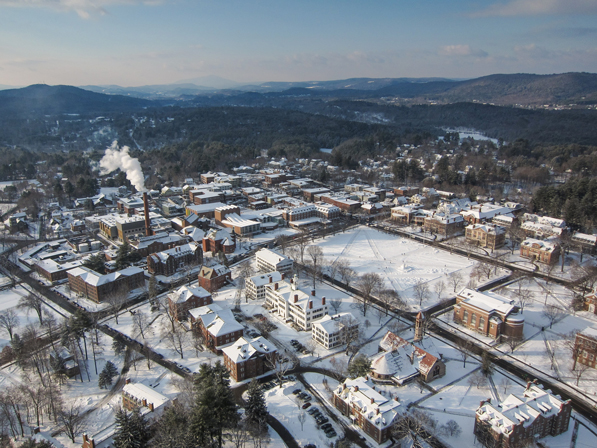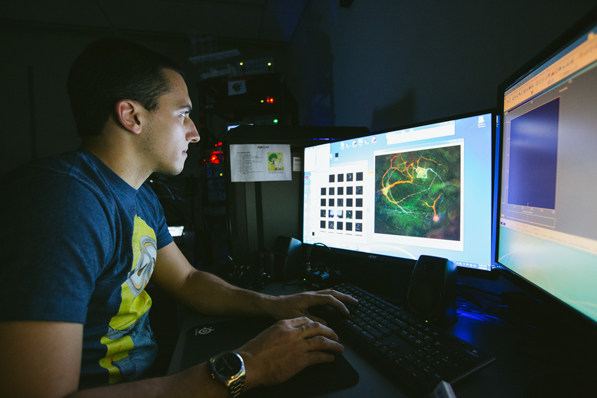The Board of Trustees voted Wednesday, Jan. 27, to establish the School of Graduate and Advanced Studies at Dartmouth, creating the College’s first new school in more than 100 years.
(Photo by Eli Burakian '00)
“The School of Graduate and Advanced Studies demonstrates Dartmouth’s commitment to research at the highest level. It will enhance the impact of our current research enterprise, help attract the most talented students and faculty, and promote collaborative, interdisciplinary efforts while maintaining Dartmouth’s high expectations for quality and excellence,” President Phil Hanlon ’77 told the trustees at their meeting Wednesday in New York.
The new graduate school will consolidate resources currently supporting approximately 800 students in 16 PhD programs and 12 masters programs, as well as 250 postdoctoral students, under the dean of the administratively independent school; the dean will report directly to the provost. The school, expected to open July 1, 2016, will also expand professional development resources for graduate students and postdocs.
The graduate school will grant Dartmouth PhDs, MS, and MA degrees, but faculty involved in those programs will retain their academic affiliations with Arts and Sciences, Geisel School of Medicine, Thayer School of Engineering, or the Tuck School of Business. The new school will also provide a hub for efforts to gain support for graduate studies from new funding sources.
Read More
Town Meetings Will Discuss Creation of Independent Graduate School
Task Force Explores Freestanding Graduate School
Chemistry Professor F. Jon Kull ’88 Appointed Dean of Graduate Studies at Dartmouth
The graduate programs will maintain connections with the departments or schools where they are currently based. The College has no plans to undertake construction for the School of Graduate and Advanced Studies, though administrators are exploring options for establishing a designated community space for graduate students.
“The graduate school will integrate graduate students and postdoctoral scholars more fully into the Dartmouth community,” says Provost Carolyn Dever. “Today’s graduate students and postdocs are tomorrow’s professors. We have an opportunity to build diversity alongside academic excellence and to support the development of teacher-scholars in the very finest Dartmouth ideal.”
Centralizing the administration of Dartmouth’s graduate programs in a new school will ensure consistent policies, regular reviews, and centralized tracking of important data and metrics, says Dean of Graduate Studies F. Jon Kull ’88.
The new framework will also provide a platform to support collaborative initiatives between departments and schools, Kull says, and offer graduate students training in important professional development skills such as writing, teaching, and communications.
Graduate student Scott Alpizar at work in the lab. (Photo by Robert Gill)
“Dartmouth will be a destination for graduate students and postdoctoral fellows who want to be expertly trained in their field while augmenting their training with best-in-class professional development opportunities, and become thoughtful leaders, ready to tackle the world’s most pressing challenges and important questions,” Kull says.
"Many Dartmouth undergraduates already realize the great value that is added to their Dartmouth experience by the opportunity to interact with and learn from graduate students and postdocs,” he says. “While course lectures will always remain the domain of Dartmouth’s professors, undergraduates also encounter graduate students as teaching assistants in class laboratories, in recitation sections and in office hours. I encourage undergraduates to get involved with research and to get to know our graduate students and postdoctoral fellows."
The trustees’ vote to establish the School of Graduate and Advanced Studies follows the recommendation of a task force, a vote in support of the creation of a school by the general faculty, and strong expressions of support from the faculties of Arts and Sciences, Geisel, Thayer, and Tuck. It completes five major institutional priorities envisioned by Hanlon since he took office in September 2013 as the College's 18th president.
In addition to founding a graduate school, Hanlon established the Society of Fellows to bring rising young postdoctoral scholars to Dartmouth; established the Innovation Center and New Venture Incubator to promote entrepreneurship on campus and throughout the Dartmouth community; secured $150 million in philanthropic funding for 10 academic clusters that will bring 30 new faculty members to Dartmouth; and in February will launch the House Communities, a residential housing system that provides students with continuity and a home base at the College distinguished by faculty leadership.
Although the School of Graduate and Advanced Studies was just established, Dartmouth has offered graduate degrees in select fields since 1885. Among Dartmouth graduate program alumni who have gone on to prominence are Marye Anne Fox, chemistry PhD ’74, chancellor of the University of California, San Diego, winner of the National Medal of Science, and a former Dartmouth trustee; Leah Somerville, psychological and brain sciences PhD ’08, assistant professor of psychology at the Harvard Center for Brain Science and a faculty member of Massachusetts General Hospital’s Center for Law, the Brain, and Behavior; and Peter Doyle PhD ’82, professor of mathematics at Dartmouth.
The last school established at Dartmouth was Tuck, founded in 1900, after industrialist Edward Tuck persuaded his former Dartmouth roommate, then-College President William Jewett Tucker, to establish the world’s first graduate business school.
Thayer School of Engineering was established in 1867 with a $40,000 endowment from Sylvanus Thayer, Class of 1807, a renowned civil engineer. The Geisel School of Medicine, founded in 1797 as Dartmouth Medical School, was the fourth medical school in the United States.
The deans of the professional schools will continue to oversee their postgraduate professional degree programs. Tuck will continue to confer its MBA degree and Geisel will continue to confer MDs.
The current level of institutional support for graduate studies and postdoctoral programs will be directed to the graduate school. Additional funding strategies and sources will be explored as needed.
The Council on Graduate Studies will have continued oversight of policies involving graduate education at Dartmouth, and will convey to the dean of the School of Graduate and Advanced Studies the priorities and concerns of the faculties and deans of arts and sciences, Thayer, Geisel, and Tuck, says Kull, who headed the task force named by Dever in 2014 to develop a plan for establishing a freestanding graduate school.

